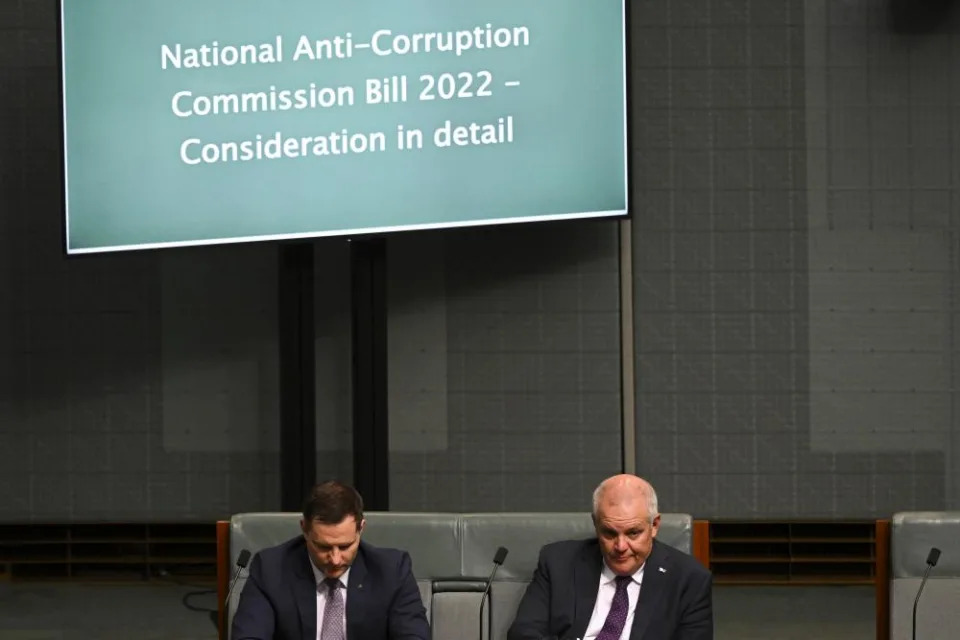Christopher Knaus
Mon, 30 January 2023

Photograph: Lukas Coch/AAP
Australia has reversed a decade-long slide in its performance on corruption and lifted itself from a record low on a key global ranking system, an improvement attributed to the soon-to-be operational anti-corruption commission.
But Transparency International Australia has urged the federal government to do more to repair its reputation on corruption and integrity by adopting more comprehensive whistleblower protections and pursuing donations and lobbying reforms.
Related: ‘Naccflip’: National anti-corruption commission bill passes Senate after Greens backdown
Transparency International released its annual corruption perceptions index (CPI) on Tuesday, showing a two-point improvement for Australia, improving its score to 75 from 100 and lifting its global ranking from 18 to 13.
Last year, Australia hit a record low score of 73 from 100. The improvement was attributed to the new government’s anti-corruption body, which will commence operation in June.Interactive
The commission, despite concerns around the high threshold needed for public hearings, is widely considered a marked improvement on the weak model proposed but never acted upon by the Morrison government.
But Transparency International Australia has warned that the government must do more on whistleblower protections, including the establishment of a dedicated whistleblower protection authority, and introduce real-time disclosure of political donations and expenditure.
“Greater oversight and transparency of lobbying and longer cooling off periods to reduce the ‘revolving doors’ of lobbying must also be prioritised,” Transparency International Australia chief executive Clancy Moore said.
Sign up for Guardian Australia’s free morning and afternoon email newsletters for your daily news roundup
“We also need stronger laws to stop corrupt officials, criminals and business people laundering money and hiding their abuses of power, through poker machines, casinos and real estate.”
The government is currently consulting on its bill to reform Australia’s public sector whistleblower protections, but lawyers, human rights groups, and the Greens have warned it has weaknesses, including its lack of protection for those who blow the whistle on personal conduct such as sexual harassment.
In the decade prior to this year’s report, Australia’s performance in the CPI has continually declined, dropping by 12 points. That decline is on par with Hungary, which, while far lower in the CPI’s global standings, has also dropped 12 points since 2012.
The CPI scores are compiled from a range of sources, up to 13 for any individual country, and include expert assessments, the experiences of business executives of corrupt behaviour in the public sector, and assessments of a nation’s anti-corruption system and the strength of its integrity bodies.
The average score in the Asia-Pacific was 45. North Korea received the lowest score at 17. New Zealand, Singapore and Hong Kong received the three strongest scores.
The report said the performance of the region had continued to stagnate.
“As authoritarianism grows and restrictions on civic space and basic freedoms imposed during the pandemic remain in place, Asia Pacific continues to stagnate for the fourth year in a row with an average score of 45 points,” the report said.
“While some governments have made headway against petty corruption, grand corruption remains common. Pacific leaders have renewed focus on anti-corruption efforts, but in Asia, they have focused on economic recovery at the expense of other priorities.”
Transparency International Australia board member and Griffith University whistleblowing expert, Prof AJ Brown, said the organisation was “delighted” at the establishment of the anti-corruption commission.
But he warned Australia’s reputation will only improve further once the commission was operational and when “other issues central to our credibility in the region are seriously addressed”.
“This needs to start with a comprehensive approach to whistleblower protection, including a whistleblower authority, and ending our role as a safe haven for corrupt actors across the region and the world,” he said.
No comments:
Post a Comment